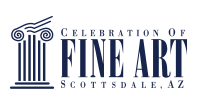Though Matt Sievers grew up with a professional artist as a father, he had his sights set on a career in business. And after earning his business degree, it was off to the races. Matt landed a sales position with GE and learned quickly that hustle, long days and hard work would reward him with financial success.
But, he was exhausted. To destress and recharge, he began painting after work. It wasn’t long before Matt realized his career in sales wasn’t sustainable over the long term. He decided to leave the business and negotiated a deal with his dad to go in on a gallery together in Arizona. It was there that Matt gained the valuable feedback and confidence he needed to pursue the next step as an artist.
That next step was showing at the Celebration of Fine Art. In a matter of months, he realized that it was possible to find success as an artist––and have a deeply meaningful and rewarding career to boot. That was an important turning point in his journey. Matt decided to close the gallery and go all in as a professional artist, and he never turned back.
Read on or watch the video below to learn more about Matt Sievers and his journey as a professional artist.
When did you know art was your calling?
I figured out art was my calling while at Utah State. I was really focused on business and I just knew I wanted to make money and be successful. So, [after college] I went to Indianapolis and was doing sales, working with GE. And I was kind of miserable. A lot of it was like door-to-door or cold calls, and really intense humidity. I’d be completely exhausted by the time I’d get back home at night. I’d start painting and all my energy would come back to me even though I was beyond exhausted.
I decided I can make money this way and that I was on a good track, but that I wouldn’t be able to survive in that field. I called my dad, explained the situation, and he said he’d matched me on an investment to open a gallery in Scottsdale, Arizona. It was a huge success. It put me in a sales position and in the place of an entrepreneur. As I was building that, it made me realize people like what I do and that the paintings that I was creating were appreciated. There was no looking back from there. I started to connect with people through art, find my voice and my style through art, that was when I knew the rest of my life was going be in the art world.
I got juried into this show––the Celebration of Fine Art––and it started out a little rough because I was running down to the gallery, trying to train salespeople there, trying to do the books, etc. The last four weeks of my first year at this show, I earned about what I had earned in a year through my gallery. And it was really this show, that made me realize, I don’t have to be a starving artist. I can be a successful artist.
What do you love most about creating art?
What I love most about the creative process is that I’m never pigeonholed. If I’m in a brooding mood and I want to do a stormy mountain, I can just express myself. And if the painting works or doesn’t work, I’m going to learn things from it. I’m going to kind of have a meditative time. And if I see this amazing sunset over an ocean, if that’s not typically my subject matter, it doesn’t matter. I’ll explore those avenues because art to me is all about emotion. Exploring how it makes you feel and using application, whether it’s big dramatic scratches, tiny scratches, transparency, stacking, layers, etc. The way each of those marks are applied, you can feel the emotion and how differently they come through.
Speaking with collectors and seeing how differently it affects them, their mood and what they get out of the piece may be completely different. It’s amazing how art affects everyone differently and whatever I think is the most powerful thing in a painting, the person who buys it, it will probably be something completely different that they think is the most powerful thing. And that’s very fun.
What brings you back to the Celebration of Fine Art?
This is the only avenue in the art world that I actually truly understand. I know who my clients are. I know which gallery owners will come through. I know how to develop my work with artists here whose critiques I appreciate and trust––as well as feedback from clients. I feel like it’s very unique for an artist to be here, almost like art camp, but also such opportunity for success in your finding your voice, your style and financially.

